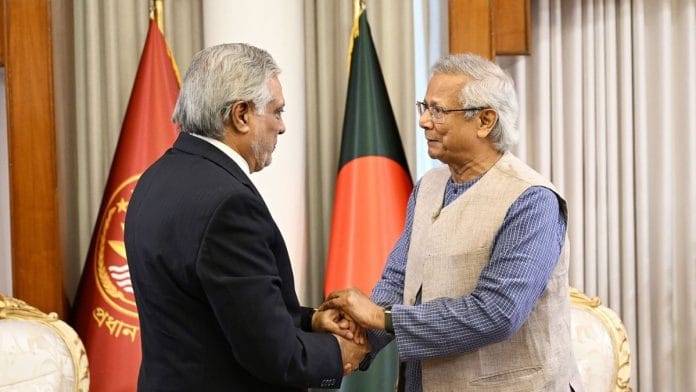New Delhi: In his first visit to Bangladesh in 13 years, Pakistan Deputy Prime Minister and Foreign Minister Ishaq Dar claimed that all issues of 1971 had been “settled” between both countries and that Bangladesh should now “clean” its heart. But Pakistan’s bid at “brotherly” relations might not be easy as Bangladesh has rejected the claims.
Dar arrived in Dhaka over the weekend, where he said that all outstanding issues related to the war, including Bangladesh’s demand for a formal apology and resolution of financial claims, had been “settled” decades ago. The last visit was in 2012 by then foreign minister Hina Rabbani Khar.
Speaking to media persons following a high-level bilateral meeting in Dhaka, Dar cited the 1974 tripartite agreement between Bangladesh, Pakistan and India, as well as former Pakistani President Pervez Musharraf’s 2002 visit to Dhaka, as evidence that the matter had been addressed.
“In all his engagements, the DPM/FM expressed Pakistan’s strong desire to forge a brotherly relationship with Bangladesh for the mutual benefit of the people of the two countries. He emphasised the need for adopting a forward-looking approach in bilateral relations, with a focus on mutual respect and mutual benefit,” the Pakistani foreign affairs ministry said in a statement released late Sunday.
“The document of that time is historic and is available in both countries,” Dar said. “Between a family, between brothers, once this is done… even Islam tells us to clean your heart.”
In response, Bangladesh Foreign Adviser Touhid Hossain said, “No, I don’t [accept that]. If I did, the problem would have been solved.” He reiterated Bangladesh’s position: a formal apology, repatriation of stranded Pakistanis and a fair share of pre-1971 financial assets remain unresolved issues.
Still, both sides struck a conciliatory tone in their public statements, agreeing to continue dialogue and expand cooperation in trade, education, and regional forums. “We acknowledged that the issues of 1971 cannot be solved in a day,” said Touhid. “We agreed to continue discussions to that end.”
When asked whether the recent uptick in engagements with Pakistan was influenced by China’s push for a trilateral framework, Touhid dismissed the notion.
“While China and Pakistan may support such trilateral initiatives, we’ve made it clear that we prefer broader cooperation, potentially even quadrilateral, involving more partners,” he said.
The adviser noted that ties with Pakistan had been intentionally downplayed by the previous government, but the current administration is working to restore and normalise the relationship as part of its broader commitment to maintaining balanced relations with all nations.
Also Read: Dhaka flags concerns over Awami League operations from Indian soil; MEA says concerns ‘misplaced’
Dar-Yunus meet: Emphasis on revitalising SAARC
During his courtesy call on interim Chief Adviser Muhammad Yunus, Dar discussed strengthening bilateral cooperation, including student exchanges, trade expansion and regional connectivity. “There are many areas where we can work together,” Dar noted, describing the two countries’ economies as “complementary”.
Yunus, in turn, emphasised the need to revitalise the South Asian Association for Regional Cooperation (SAARC), which has largely remained inactive. “I see our relationship with Pakistan and other SAARC countries as one of the highest priorities,” he said.
The visit yielded tangible outcomes. Bangladesh and Pakistan signed six agreements and memoranda of understanding (MoUs), including a visa waiver agreement for diplomatic and official passport holders, the establishment of a Joint Working Group on Trade, MoUs between strategic and media institutions of both countries, a Cultural Exchange Program, and an academic exchange MoU between the two nations’ foreign service academies.
Pakistan also announced the launch of a “Pakistan-Bangladesh Knowledge Corridor”, which will offer 500 scholarships to Bangladeshi students and 100 training slots for civil servants over the next five years. The number of annual scholarships under the Pakistan Technical Assistance Program will be increased fivefold.
On economic cooperation, both sides noted the trade imbalance—Bangladesh exported $78 million worth of goods to Pakistan in FY2024-25, compared to Pakistan’s $865 million. Dhaka called for greater access for its textiles, pharmaceuticals and IT products under the South Asian Free Trade. Area (SAFTA )and proposed direct shipping routes between Chattogram and Karachi.
Pakistan expressed interest in exporting energy and hinted at improved air connectivity. Dar announced that Fly Jinnah would begin direct flights between the two countries by October, with PIA to follow post-privatisation.
Dar also met with opposition leaders, including Khaleda Zia of the Bangladesh Nationalist Party and Dr Shafiqur Rahman of Jamaat-e-Islami.
(Edited by Sugita Katyal)
Also Read: US think tank says religious freedom in Pakistan is dire. ‘Govt tolerates, enables it’






